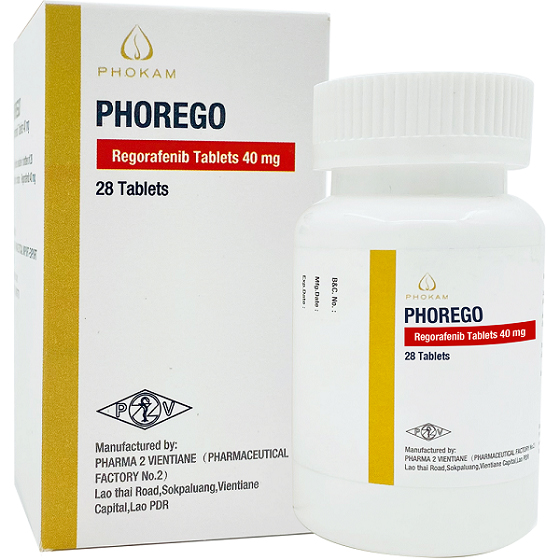Precautions for Using Regorafenib

Precautions for Using Regorafenib
In the field of cancer treatment, Regorafenib, as a drug used to treat a variety of solid tumors, is widely applied in the treatment of malignant tumors such as colorectal cancer, gastrointestinal stromal tumors, and liver cancer. However, its use is accompanied by certain risks. Understanding and following the precautions for use is crucial for patients to achieve good treatment results and reduce side effects. At the same time, the relatively high price of the drug also brings certain economic pressure to patients. While using the drug reasonably, paying attention to medical insurance policies and assistance programs has also become an important task for patients. Next, let's take a detailed look at the precautions for using Regorafenib.
The pharmacological mechanism of Regorafenib lies in that it is a multi-kinase inhibitor. By inhibiting multiple kinases related to tumor growth, angiogenesis, and the tumor microenvironment, it can inhibit the proliferation of tumor cells and tumor angiogenesis. However, while exerting its therapeutic effect, it may also cause a series of adverse reactions. For example, it may cause severe hepatotoxicity, so liver function needs to be monitored regularly; it may cause hypertension during use, so blood pressure should be monitored; it may lead to hand-foot syndrome, and skin reactions need to be paid attention to; it can increase the risk of bleeding, especially when used in combination with anticoagulant drugs; it may cause cardiac events, so cardiovascular risks need to be evaluated; women of childbearing age should take effective contraceptive measures to prevent the potential harm of the drug to the embryo.
1. Take the Medicine on Time Strictly According to Doctor's Orders
As a targeted drug, the efficacy of Regorafenib is closely related to the stable drug concentration in the body. Patients must take the medicine strictly according to the doctor's prescription and guidance, and never miss a dose or change the way of taking the medicine and the dosage casually. If you accidentally forget to take the medicine or encounter other special situations, consult a doctor immediately and follow the doctor's advice. Arbitrary adjustment of medication may not only reduce the efficacy of the drug but also increase the probability of adverse reactions.
2. Pay Attention to Diet and Prohibited Foods
During the period of taking Regorafenib, diet management is of great importance. Patients should try to avoid consuming irritating foods, greasy foods, and foods that are irritating to the stomach and intestines, such as spicy foods and raw and cold foods. These foods may increase the burden on the gastrointestinal tract and cause or aggravate digestive discomfort symptoms such as nausea, vomiting, and diarrhea. Maintaining a light diet and consuming more easily digestible foods helps to maintain a good nutritional status of the body, reduce physical discomfort caused by improper diet, and better cooperate with drug treatment.
3. Regularly Monitor and Report Side Effects
During the treatment with Regorafenib, regular monitoring of relevant indicators is an essential part. Patients need to undergo regular examinations such as blood biochemistry and tumor markers to keep track of the drug's efficacy and physical condition. At the same time, pay close attention to changes in your own body. Once any discomfort symptoms such as dizziness, nausea, diarrhea, and skin reactions occur, even if the symptoms seem mild, report them to the doctor in a timely manner. The doctor will give professional advice based on the specific situation and deal with the side effects promptly to avoid delaying the best treatment opportunity.
4. Be Aware of Drug Interactions
Regorafenib may interact with other drugs, and such interactions may change the efficacy of the drugs or increase the risk of side effects. Therefore, when using Regorafenib, patients must inform the doctor of all the medications they are taking, including prescription drugs, over-the-counter drugs, and dietary supplements. The doctor will comprehensively evaluate the potential drug interactions based on this information and make corresponding adjustments to the medication to ensure the safety and effectiveness of the treatment.
As an important anti-tumor drug, Regorafenib is of great significance to patients. During the use process, patients should strictly follow the doctor's advice, use the drug standardly, have a reasonable diet, monitor side effects in a timely manner, and avoid drug interactions. In this way, it is possible to maximize the treatment effect and reduce potential risks. If you have any questions or concerns during the medication process, if necessary, you can consult the customer service of Dingxiang. I hope every patient can complete the treatment smoothly and recover soon.
Here are some relevant case Q&A:
Question: I missed a dose of Regorafenib during the period of taking it. What should I do?
Answer: If you accidentally miss a dose of Regorafenib, do not take a double dose immediately after discovering the missed dose. Generally, if there is still a long time before the next dose, you can take the missed dose as soon as possible; but if it is close to the time for the next dose, just skip the missed dose and take the next dose at the normal time and dose. However, for the specific handling method, it is still necessary to consult a doctor in a timely manner. The doctor will give the most appropriate advice according to your actual situation to avoid affecting the treatment effect or causing adverse reactions due to incorrect dose supplementation.
Question: I already have hypertension. Can I still use Regorafenib?
Answer: Regorafenib may cause an increase in blood pressure, so extra caution is needed when using it if you already have hypertension. Before deciding to use Regorafenib, be sure to inform the doctor in detail about your hypertension condition and the current treatment situation. The doctor will comprehensively evaluate your overall health status, blood pressure control situation, as well as the necessity and potential risks of using Regorafenib. During the medication process, you need to monitor your blood pressure more frequently. Once you find abnormal blood pressure elevation or experience discomfort symptoms such as dizziness and headache, inform the doctor immediately. The doctor may adjust the antihypertensive drugs or make corresponding adjustments to the use of Regorafenib according to the situation.
Question: The price of Regorafenib is too high for me to afford. What can I do?
Answer: The price of Regorafenib may indeed bring great economic pressure to patients. You can first understand the local medical insurance policy. In many areas, it has been included in the scope of medical insurance reimbursement, and the out-of-pocket cost will be much reduced after reimbursement. In addition, some charitable organizations or pharmaceutical companies will carry out patient assistance programs. You can consult your doctor for relevant information or learn about the application conditions and procedures through official channels to see if you meet the assistance criteria. At the same time, you can also communicate with the doctor to explore whether there are other suitable alternative treatment options or combined treatment methods to minimize the economic burden while ensuring the treatment effect.

